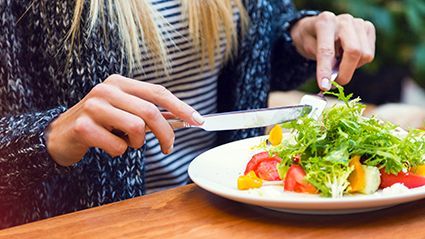TUESDAY, Jan. 3, 2023 (HealthDay News) — If you’ve ever thought you must absorb more calories from food than other people do, you might be onto something: A new study hints that some people’s gut bacteria extract more energy, as in calories, from food — possibly contributing to weight gain.
The study, of 85 overweight adults, found that those with a particular gut bacteria profile — dubbed the “B-type” — had less energy density in their stool samples, versus people with other bacterial profiles.
“Energy” is what most of us know as calories, and the finding suggests that people with a B-type gut might pull more calories from their food before it’s eliminated as waste.
And it’s possible, though not proven, that could influence body weight, the researchers added.
On average, study participants with a B-type gut weighed about 20 pounds more than participants with another gut bacteria profile dubbed the R-type, according to senior researcher Henrik Roager.
The big caveat is it’s not clear what caused that weight difference, said Roager, an associate professor at the University of Copenhagen, in Denmark.
“Future studies should investigate whether individuals receiving the same amount of calories would differ in weight gain, depending on their gut microbes’ ability to extract energy,” he suggested.
The study, published online recently in the journal Microbiome, is one of the latest looks at the gut microbiome — the vast collection of bacteria and other microbes that live in the human digestive tract.
Bacteria in the colon break down food components, like fiber, that the body’s digestive enzymes cannot.
But the gut microbiome is believed to do much more than aid in digestion. Studies show that the microbes are involved in everything from immune system defenses to producing vitamins, anti-inflammatory compounds and even chemicals that influence the brain.
Every person has a unique gut microbiome composition, determined by genetics, diet and other lifestyle habits, and environmental exposures, like antibiotics and other medications.
The Danish adults in the new study could be separated into three groups based on which bacterial communities tended to dominate their guts: B-types, dominated by Bacteroides; R-types, where Ruminococcaceae dominate; and P-types, dominated by Prevotella bacteria.
Research in mice has offered strong evidence that the gut’s microbial composition can spur weight gain: Over a decade ago, scientists found that lab mice given a transplant of fecal material from obese humans subsequently packed on pounds; those given a transplant from lean humans stayed slim.
Humans, however, are not lab mice.
“It’s more complicated and equivocal when you study humans,” said Sean Gibbons, a microbiome researcher who was not involved in the new study.
Still, there is evidence that your gut germs help shape your response to diet, according to Gibbons, an associate professor at the Institute for Systems Biology, in Seattle.
One study, for example, found that P-types lost weight in response to a high-fiber diet. B-types had no such luck.
In their own recent study, Gibbons and his colleagues found that the gut microbiome seemed to be a key factor in whether people lost weight in response to diet and lifestyle changes.
In that case, people who did not lose weight had microbiomes that (among other things) tended to break down non-absorbable fibers and starches into absorbable sugars.
Where do the new findings fit in? Gibbons said it’s a “bit murky.”
The results, he said, do not prove that B-type microbiomes actually extract more energy from food. And even if they do, it’s not clear what that means for weight gain, or weight loss.
While R-types in this study weighed less than B-types, there could be any number of reasons, according to Gibbons. R-types, for example, tend to show less systemic inflammation, which can affect weight.
In other words, Gibbons said, there’s a lot left to learn about how gut microbes influence body weight. But in general, both he and Roager said, researchers hope to move toward an era of “precision nutrition,” where people could be given tailored diet advice based on their gut microbiome.
How about changing your microbiome? The bacterial composition of the gut is actually “surprisingly stable,” Roager said.
Gibbons agreed that people’s gut microbiomes are pretty stable, and there’s a lack of proven ways to tweak it. But, he said, the gut may benefit from a diet such as the traditional Mediterranean one — rich in vegetables, fish and fiber, and low in processed foods and red meat.
“That would have an impact on the gut microbiome, but it will take time,” Gibbons said. “And you would have to stick with it.”
More information
The Harvard School of Public Health has more on the gut microbiome.
SOURCES: Henrik Munch Roager, PhD, associate professor, department of nutrition, exercise and sports, University of Copenhagen, Denmark; Sean M. Gibbons, PhD, associate professor, Institute for Systems Biology, Seattle, affiliate faculty, genome sciences and bioengineering departments, University of Washington, Seattle; Microbiome, Dec. 12, 2022, online
Copyright © 2025 HealthDay. All rights reserved.

